- Home
- Reki Kawahara
Alicization Lasting
Alicization Lasting Read online
Copyright
SWORD ART ONLINE, Volume 18: ALICIZATION LASTING
REKI KAWAHARA
Translation by Stephen Paul
Cover art by abec
This book is a work of fiction. Names, characters, places, and incidents are the product of the author’s imagination or are used fictitiously. Any resemblance to actual events, locales, or persons, living or dead, is coincidental.
SWORD ART ONLINE Vol.18
©REKI KAWAHARA 2016
Edited by Dengeki Bunko
First published in Japan in 2016 by KADOKAWA CORPORATION, Tokyo.
English translation rights arranged with KADOKAWA CORPORATION, Tokyo, through Tuttle-Mori Agency, Inc., Tokyo.
English translation © 2020 by Yen Press, LLC
Yen Press, LLC supports the right to free expression and the value of copyright. The purpose of copyright is to encourage writers and artists to produce the creative works that enrich our culture.
The scanning, uploading, and distribution of this book without permission is a theft of the author’s intellectual property. If you would like permission to use material from the book (other than for review purposes), please contact the publisher. Thank you for your support of the author’s rights.
Yen On
150 30th Street, 19th Floor
New York, NY 10001
Visit us at yenpress.com
facebook.com/yenpress
twitter.com/yenpress
yenpress.tumblr.com
instagram.com/yenpress
First Yen On Edition: January 2020
Yen On is an imprint of Yen Press, LLC.
The Yen On name and logo are trademarks of Yen Press, LLC.
The publisher is not responsible for websites (or their content) that are not owned by the publisher.
Library of Congress Cataloging-in-Publication Data
Names: Kawahara, Reki, author. | Abec, 1985– illustrator. | Paul, Stephen, translator.
Title: Sword art online / Reki Kawahara, abec ; translation, Stephen Paul.
Description: First Yen On edition. | New York, NY : Yen On, 2014–
Identifiers: LCCN 2014001175 | ISBN 9780316371247 (v. 1 : pbk.) | ISBN 9780316376815 (v. 2 : pbk.) | ISBN 9780316296427 (v. 3 : pbk.) | ISBN 9780316296434 (v. 4 : pbk.) | ISBN 9780316296441 (v. 5 : pbk.) | ISBN 9780316296458 (v. 6 : pbk.) | ISBN 9780316390408 (v. 7 : pbk.) | ISBN 9780316390415 (v. 8 : pbk.) | ISBN 9780316390422 (v. 9 : pbk.) | ISBN 9780316390439 (v. 10 : pbk.) | ISBN 9780316390446 (v. 11 : pbk.) | ISBN 9780316390453 (v. 12 : pbk.) | ISBN 9780316390460 (v. 13 : pbk.) | ISBN 9780316390484 (v. 14 : pbk.) | ISBN 9780316390491 (v. 15 : pbk.) | ISBN 9781975304188 (v. 16 : pbk.) | ISBN 9781975356972 (v. 17 : pbk.) | ISBN 9781975356996 (v. 18 : pbk.)
Subjects: CYAC: Science fiction. | BISAC: FICTION / Science Fiction / Adventure.
Classification: pz7.K1755Ain 2014 | DDC [Fic]—dc23
LC record available at https://lccn.loc.gov/2014001175
ISBNs: 978-1-9753-5699-6 (paperback)
978-1-9753-5700-9 (ebook)
E3-20191203-JV-NF-ORI
CHAPTER TWENTY-ONE
AWAKENING (CONT.), JULY 7TH, 2026 AD / NOVEMBER 7TH, 380 HE
6
“I…will never…! For…give…you……”
Krsh!!
A second sword pierced Klein’s back.
More tears flooded from Asuna’s eyes. It was a wonder that she had any left.
Despite being pinned to the ground by the blades, Klein continued to scrabble at the soil. Over him loomed the one-time agitator in the black poncho—the former leader of Laughing Coffin, PoH.
“Oh, man, I can’t watch this. You should’ve stayed put like the small fry you are. This is what happens when you mess with the big dogs,” he chided, spreading his hands and shaking his head. In a moment, he spoke to the red knights standing behind Klein in a language Asuna couldn’t recognize. One of the players nodded and raised yet another sword.
The third blade gleamed, ready to eliminate the last of Klein’s remaining HP.
“Hajimaaaaa!!”
A scream that sounded like Korean emerged from a lone red soldier who raced through the crowd from the rear. He made it just in time to block the downward strike with a blade of his own.
No way…Why does it hurt so much?
Wol-Saeng Jo, under the player name Moonphase, slumped to the ground and braced himself against the agony of having his back sliced by the man in the poncho.
Wol-Saeng’s AmuSphere was supposed to be able to transfer only a tiny amount of physical pain signals to the brain. In Silla Empire, the game he was used to playing, even an enormous dragon crushing your avatar’s head in its jaws produced nothing more than a slight numbing shock.
But Wol-Saeng felt like stove burners were being pressed against the skin of his back. And yet, the pain of suffering the same physical blow in reality would probably be even worse. Wol-Saeng considered himself somewhat of a VRMMO veteran, and even he could barely react in time to the black-poncho man’s speedy attack with the thick, heavy kitchen knife. If he suffered that kind of blow in real life, it would probably be instantly fatal or, at the very least, painful enough to knock him unconscious. That meant this was still nothing more than virtual, simulated pain, but that realization didn’t help him very much. Unbearable pain was still unbearable, no matter the source. He wished he could log out immediately, circumstances be damned.
Instead, Wol-Saeng curled into a ball on the dark earth and endured.
After all, he couldn’t accept the story he had been told:
Supposedly, Japanese hackers had attacked a test server belonging to a new VRMMORPG under development by a team of American, Chinese, and Korean gamers and were killing the testers within the server. And now those testers needed help from outside players to stop the Japanese barbarism.
At least, that was the message going around on social media to get them to dive in. They saw scenes of a group of Japanese players attacking another group of what appeared to be Americans.
But was the video really depicting what the messages claimed it did?
To Wol-Saeng’s eyes, the Japanese players were the desperate ones, and the Americans looked more like players in a game. Thanks to thousands upon thousands of Chinese and Korean “reinforcements,” the tide of battle had turned, and now the Japanese were powerless—but the discrepancy of their attitudes remained the same. Even with their gear destroyed and HP nearly gone, they were desperate to do something…Not to destroy, but perhaps to protect something?
Indeed, just moments before, a woman speaking fluent Korean had emerged from the pack of Japanese players and said:
You are being lied to!! This server belongs to a Japanese company! We are not hackers! We are connected legitimately!! …Those were Americans, who were brought here under false pretenses, just like you! You’re the ones who are being used as tools of sabotage!!
She had called herself Siune. Something in her tone had resonated with Wol-Saeng; he had made his way over to her through the combat and asked, Do you have any means of proving what you’ve told us?
One of Siune’s companions was about to say something in Japanese when the man in the black poncho slashed Wol-Saeng across the back, knocking him to the ground.
Everything after that happened in the blink of an eye, and it was entirely one-sided. The Japanese group was overwhelmed by the crimson soldiers, the majority of the former logging out from HP loss, with less than two hundred survivors being stripped of their weapons and rounded up.
The man in the poncho appeared at the front line again, seemingly to make a victory speech—but instead, he did something quite unusual:
He had one player, who was sitting in a wheelchair and clutching two
swords, wheeled forward from the Japanese rear guard and began to speak to him in fluent Japanese.
Once again, Wol-Saeng felt that something was wrong.
What did it mean for someone to be in a wheelchair in a virtual game?
In Silla Empire, which Wol-Saeng was most familiar with, localized leg damage could cause a Crippling Debuff, which affected your ability to walk, but you eventually recovered with magic, medicine, or time. If a player couldn’t walk long enough that he needed a wheelchair, it wasn’t really a game anymore.
Plus, the young man in black seemed to have some kind of mental disability. He gave no reaction to the poncho man’s speech and simply sat there when the wheelchair was shoved. He almost seemed like an empty husk of an avatar, like a rag-doll body belonging to a player who wasn’t logged in.
Eventually, the man in the black poncho grew annoyed, put his foot on one of the wheels, and kicked the chair over. Wol-Saeng gasped, forgetting the pain in his back. Even the other Koreans around him seemed a bit stunned by this.
The young man toppled onto the ground, where he finally performed some kind of voluntary action: He reached for the white sword, one of the two he’d been cradling. He used his left hand, because his right arm was missing from the shoulder down, Wol-Saeng now realized.
But he couldn’t reach it. The aggressor had lifted the sword up, just a bit out of reach, the way an adult might pick on a helpless child. The young man strained, not getting off the ground, reaching for the object, but his tormentor grabbed his arm and yanked him upward. He yelled something at the helpless young man and slapped him a few times on the face.
Suddenly, there was a new voice shouting. One of the apprehended Japanese players, a man wearing samurai-like armor and a bandana around his head, attempted to grab the aggressive man in black.
But one of the Korean players behind him raised his sword and drove it deep through the samurai’s body. That had to have hurt even more than Wol-Saeng’s injury, but the Japanese warrior tried to keep crawling forward until a second sword prevented his advance.
The man in the black poncho gave the skewered samurai a twisted smile. He issued an order in Korean to the red knights: “Kill him. He’s just in the way.”
One of the knights obeyed and raised a third sword.
It was impossible to sit back and watch any further. There was no guarantee that Siune’s explanation was the truth, but at the very least, the way this man would kick over a wheelchair was revolting—and the earnest desperation in the samurai’s actions carried the conviction of one trying to protect his friends.
Wol-Saeng didn’t have a particularly positive image of Japan. Beyond the history and territorial arguments between the countries, there was an insular nature to the island nation, a derisive kind of arrogance, as if to say that they were the only East Asian country worth caring about. The fact that The Seed Nexus was open to Europe and North America but closed off to Korea and China was an excellent example of that attitude.
But…
Japan as a whole did not represent every single individual from Japan. Going back to pre-VRMMO PC-gaming days, there were a few titles with international servers where you could play with people around the world. He’d had bad experiences with Japanese players, but also many good ones.
Wol-Saeng felt disgusted by the actions of the man in the black poncho, and he wanted to believe in Siune and the samurai man. Not because they were Japanese or Korean. It was just his personal conscience telling him this was right.
The instant he moved, more blinding pain stemming from his back shot through his head, but he gritted his teeth and got to his feet. Then he drew his sword, took a deep breath, and…
“…Hajimaaa!!” (“…Stoppp!!”)
…rushed forward, yelling with as much force as he could muster.
Wol-Saeng’s default avatar had average stats and felt slow and heavy compared to his agile Silla Empire character, Moonphase. But throughout whatever bonus effect it was, he now raced across the wasteland like the wind and just barely succeeded in blocking the sword meant to end the samurai’s life.
“What…what are you doing?!” demanded the Korean attacker, his voice a mixture of shock and, much more so, anger. Wol-Saeng wouldn’t have been able to communicate if it had been a Chinese player, so he knew he had to make use of this good fortune and state his case.
“Don’t you think there’s something strange about this?! The battle is already won! What reason could there be to torment and torture these people?!”
His compatriot was briefly silent. His eyes traveled to the samurai below, then to the youngster tossed from the wheelchair nearby. Behind his visor, his eyes blinked frequently in surprise. Now that the fervor of battle was waning, this player, too, was slowly realizing the wrongness of what was happening. The force pushing against his blade began to soften.
But before Wol-Saeng could say anything else, a sharp cry issued forth from the crowd around them.
“Baesinja!!” (“Traitor!!”)
“Kill him, too!!”
With the anger of his fellows spurring him on, the red knight put more strength back into his sword arm. But the next words to be spoken came as a surprise.
“Wait! Let’s hear him out!”
“He’s right—the guy in the poncho’s going too far!”
Other Korean players in the crowd were arguing on Wol-Saeng’s behalf now. Those little fires spread across the mass of players, dividing the crowd into hard-liners who demanded the slaughter of the remaining Japanese and moderates who preferred to wait for a proper explanation before any action was taken. That same dynamic spread to the Chinese players, too, and even more angry shouts—these indecipherable to Wol-Saeng—echoed across the wasteland.
How was the one man seemingly in charge going to contain this chaos? Wol-Saeng spun around to find out.
The one who’d started all this was standing over the one-armed youth from the wheelchair, spinning his large, thick dagger in his fingers. Shaded beneath his hood, his mouth was wide and twisted.
It took a while for it to be apparent that he was not gnashing his teeth in anger but stifling laughter. A cold sensation ran up Wol-Saeng’s back, strong enough to numb his pain.
There was no way the man in the black poncho had anything to do with any game made by Chinese, Korean, or American developers. In fact, the existence of such a game seemed suspicious at this point. Whoever he was, there was real blood and pain in this battle, and he was trying to get players of various countries to fight…and kill one another. That was his only goal.
Though it sounded as if it came from another person’s mouth, Wol-Saeng felt the Korean word for “demon” pass through his lips.
“……Angma……”
Vassago Casals was born to a Hispanic mother and a Japanese American father in the Tenderloin, a lower-class neighborhood in San Francisco.
In America, baby names that seemed likely to limit the opportunities of the child, who didn’t have a choice in the matter, were often rejected at the stage of the birth certificate. That was the only reason his mother had named him Vassago instead of Devil or Satan. Vassago, the prince of hell, was a name with only minor recognition, so the city clerk accepted the name, none the wiser.
There was only one reason a mother would give her child the name of a demon, and that was because she never wanted him—because she hated him.
He didn’t know how his parents had met, nor did he want to, but as far as he understood, it was a monetary relationship. The pregnancy wasn’t planned, and his mother wanted to abort him, but his father forced her to go through with it. That didn’t mean that he loved the son who was born; he checked in every now and then on the child’s health but never even brought so much as a gift. About the only thing he ever gave Vassago was the ability to speak Japanese.
It was only when Vassago was around fifteen years old that he finally understood why his father had forced his mother to give birth and then had made only the bare minim
um of child support payments.
That was when he was told that there was a child with congenital kidney failure on his father’s side of the family—and they wanted him to be a donor. He had no choice in the matter. But Vassago gave his own condition: He wanted to live in his father’s country, Japan. Once he had donated a kidney, his father would have no use for him, so the status of his financial support would be in limbo. If he had to stay in the slums and deal drugs to survive, he knew where that story would end—so he preferred to start over in a new country entirely.
His father accepted, and in exchange for his left kidney, Vassago received a passport and airfare. He left for Japan without saying good-bye to his mother. When he arrived, fate was even crueler than he could have realized.
By Japanese law, international adoption involved complicated paperwork and stringent requirements, and even if the adoption process was successful, children above the age of six were not automatically given the right to stay in the country. Vassago had no choice but to live outside of the law from the moment he arrived.
So he wound up in the care of a Korean crime syndicate. Because he could speak English, Spanish, and Japanese, they provided Vassago with a fake ID and trained him to be a hit man.
Vassago completed nine successful jobs in the five years before he turned twenty. The tenth job was something he could never have imagined.
His job was to reach and kill a target that could never be found in the real world—the target was in a virtual world instead.
When it was first described to him, he didn’t know what it meant. Only when he was given an explanation of the SAO Incident, which had arisen just a few days earlier, did it make sense to him. The target was a victim of the Incident, stuck at home under strict security, never to emerge. If they waited for the deadly game to kill him, there was no telling when that would happen or if he might survive and escape eventually. But if they could get into the same game and kill his character, the NerveGear would kill him in real life.
That still left three major problems to solve.

 Signal Fire at the Water’s Edge
Signal Fire at the Water’s Edge Alicization Uniting
Alicization Uniting Sword Art Online Progressive 5
Sword Art Online Progressive 5 Cradle of Stars
Cradle of Stars Archangel of Savage Light
Archangel of Savage Light Alicization Lasting
Alicization Lasting The Black Dual Swordsman
The Black Dual Swordsman Alicization Rising
Alicization Rising Alicization Dividing
Alicization Dividing Pull of the Dark Nebula
Pull of the Dark Nebula Snow White’s Slumber
Snow White’s Slumber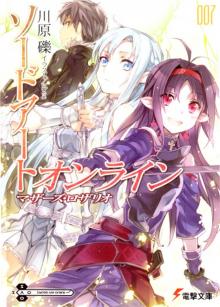 Sword Art Online - Volume 7 - Mother's Rosario
Sword Art Online - Volume 7 - Mother's Rosario Fairy Dance 1
Fairy Dance 1 The Igniter
The Igniter Aincrad 2
Aincrad 2 Fairy Dance 2
Fairy Dance 2 Sword Art Online Progressive 4
Sword Art Online Progressive 4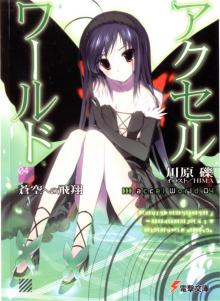 Accel World: Flight Towards the Blue Sky
Accel World: Flight Towards the Blue Sky Sword Art Online - Volume 9 - Alicization Beginning
Sword Art Online - Volume 9 - Alicization Beginning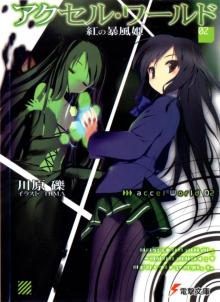 Accel World: Crimson Storm Princess
Accel World: Crimson Storm Princess The Binary Stars of Destiny
The Binary Stars of Destiny Aincrad 1
Aincrad 1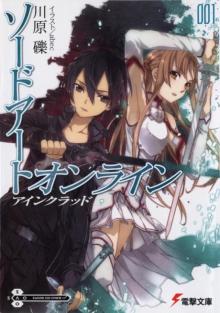 Sword Art Online - Volume 1 - Aincrad
Sword Art Online - Volume 1 - Aincrad The Floating Starlight Bridge
The Floating Starlight Bridge Sword Art Online Progressive 2
Sword Art Online Progressive 2 The Red Crest
The Red Crest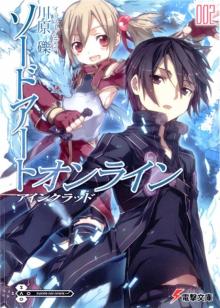 Sword Art Online - Volume 2 - Aincrad (Side Stories)
Sword Art Online - Volume 2 - Aincrad (Side Stories) Alicization Turning
Alicization Turning Flight Toward a Blue Sky
Flight Toward a Blue Sky Accel World: Floating Bridge in Starlight
Accel World: Floating Bridge in Starlight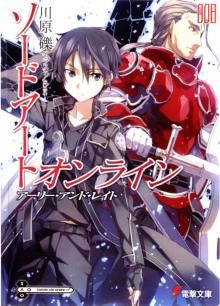 Sword Art Online - Volume 8 - Early and Late
Sword Art Online - Volume 8 - Early and Late The Biter
The Biter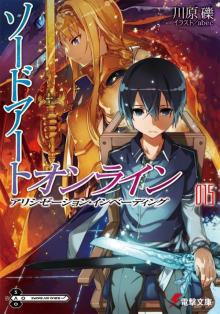 SAO 15 - Alicization Invading
SAO 15 - Alicization Invading Accel World: Return of Princess Snow Black
Accel World: Return of Princess Snow Black The Twilight Marauder
The Twilight Marauder Mother's Rosary
Mother's Rosary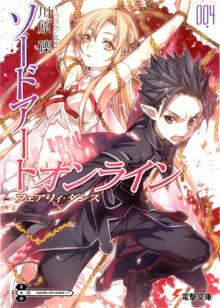 Sword Art Online - Volume 4 - Fairy Dance
Sword Art Online - Volume 4 - Fairy Dance Sword Art Online Progressive
Sword Art Online Progressive The Seven-Thousand-Year Prayer
The Seven-Thousand-Year Prayer Early and Late
Early and Late Sword Art Online Progressive - Volume 01
Sword Art Online Progressive - Volume 01 Sword Art Online Progressive 3
Sword Art Online Progressive 3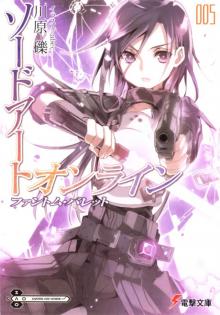 Sword Art Online - Volume 5 - Phantom Bullet
Sword Art Online - Volume 5 - Phantom Bullet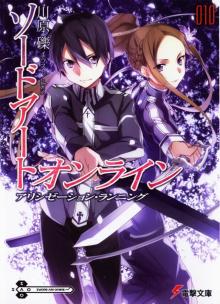 Sword Art Online - Volume 10 - Alicization Running
Sword Art Online - Volume 10 - Alicization Running Elements
Elements Shrine Maiden of the Sacred Fire
Shrine Maiden of the Sacred Fire Phantom Bullet 1
Phantom Bullet 1 The Red Storm Princess
The Red Storm Princess Kuroyukihime’s Return
Kuroyukihime’s Return Accel World: Dusk Robber
Accel World: Dusk Robber Alicization Running
Alicization Running Armor of Catastrophe
Armor of Catastrophe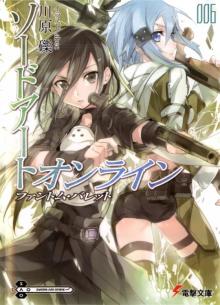 Sword Art Online - Volume 6 - Phantom Bullet
Sword Art Online - Volume 6 - Phantom Bullet Volume 16
Volume 16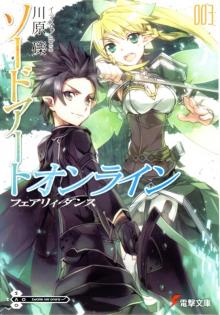 Sword Art Online - Volume 3 - Fairy Dance
Sword Art Online - Volume 3 - Fairy Dance Alicization Beginning
Alicization Beginning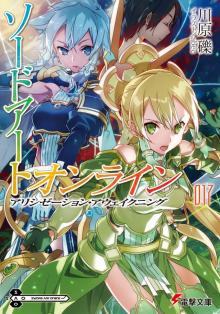 Sword Art Online Volume 17 - Alicization Awakening
Sword Art Online Volume 17 - Alicization Awakening Sword Art Online Progressive 1
Sword Art Online Progressive 1 The Trancer
The Trancer Phantom Bullet 2
Phantom Bullet 2